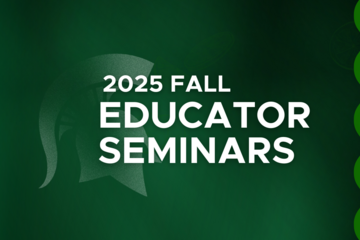We found 30 results that contain "educator"
Posted on: #iteachmsu

Assessing Learning
Instruction, Feedback, Assessments & Centering Students in Remote Environments
Posted by:
Makena Neal

Posted on 1: #iteachmsu

Instruction, Feedback, Assessments & Centering Students in Remote Environments
ASSESSING LEARNING
Posted by:
Makena Neal

Posted on: #iteachmsu

Pedagogical Design
2025 Fall Educator Seminars
Posted by:
Rashad Muhammad

Posted on: #iteachmsu

Pedagogical Design
Peer-Educator Dialogues & Learning Session Observation
Authored by:
Makena Neal

Posted on: #iteachmsu

Pedagogical Design
Teaching & Learning Conference Day 2: Thursday–Virtual day with online sessions (all day)
Authored by:
Dave Goodrich
Posted on 1: #iteachmsu

Teaching & Learning Conference Day 2: Thursday–Virtual day with online sessions (all day)
PEDAGOGICAL DESIGN
Authored by:
Dave Goodrich
Posted on: Spring Conference on Teaching & Learning

Pedagogical Design
Conference Information
Authored by:
Center for Teaching and Learning Innovation

Posted on: GenAI & Education

AI for MSU Educators
Authored by:
Instructional Technology and Development Team at IT

Posted on 1: GenAI & Education

AI for MSU Educators
Authored by:
Instructional Technology and Development Team at IT

Posted on: GenAI & Education

Pedagogical Design
Generative AI Syllabus Guide
Posted by:
Makena Neal

Posted on: #iteachmsu

Pedagogical Design
A calming influence: Managing conflict and difficult conversations in the university classroom
Authored by:
Center for Teaching and Learning Innovation

Posted on 1: #iteachmsu

A calming influence: Managing conflict and difficult conversations in the university classroom
PEDAGOGICAL DESIGN
Authored by:
Center for Teaching and Learning Innovation

